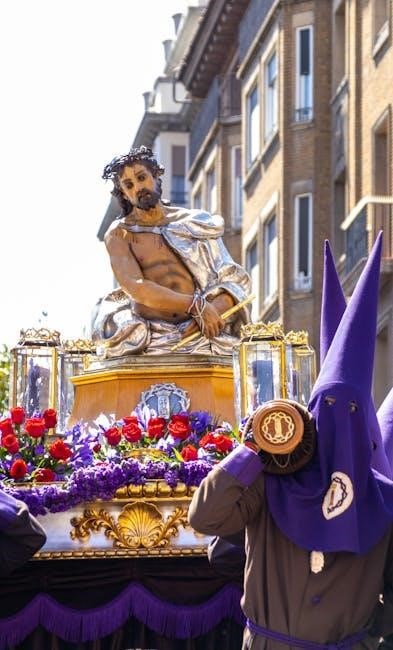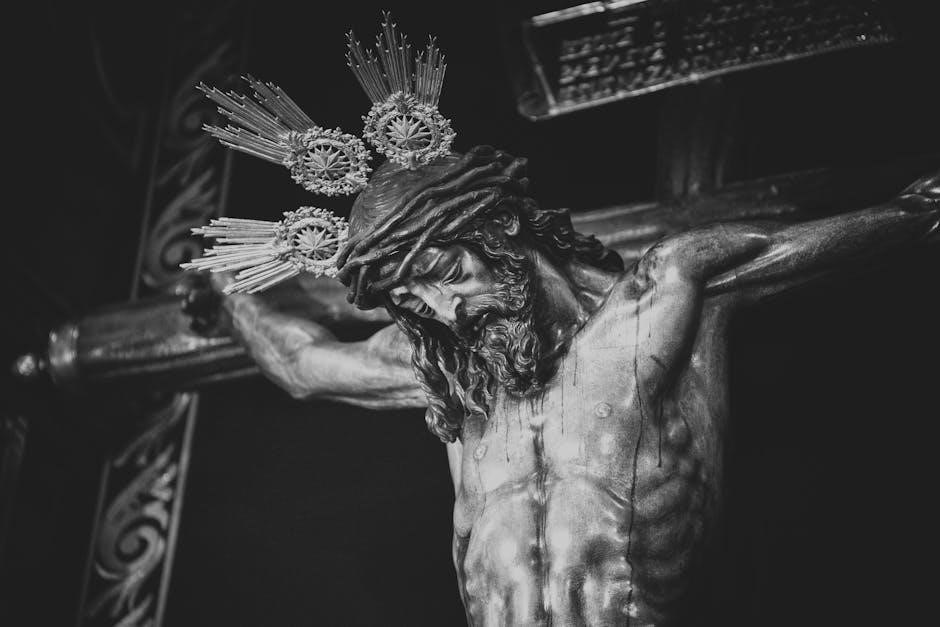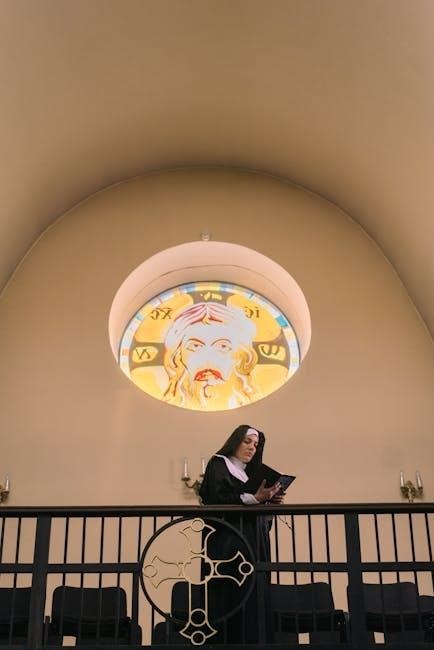Passion Week, the final week of Jesus’ life, begins with Palm Sunday and culminates in Easter. It highlights His triumphal entry, the Last Supper, crucifixion, and resurrection, emphasizing theological significance and modern commemorations worldwide.
Key Events of Passion Week
Passion Week, also known as Holy Week, recounts the pivotal events of Jesus’ last days before His resurrection. It includes the Triumphal Entry, the Last Supper, and the Crucifixion, culminating in Easter, symbolizing redemption and new life.

Triumphal Entry into Jerusalem
The Triumphal Entry into Jerusalem marks the beginning of Passion Week, commemorating Jesus’ arrival as the Messiah. On Palm Sunday, Jesus rode a donkey into the city, symbolizing humility and peace. The crowd, recognizing Him as the Messiah, laid palm branches and cloaks on the ground, shouting, “Hosanna!” This act fulfilled Old Testament prophecies and highlighted Jesus’ divine mission. The event also set the stage for the conflicts and events leading to His crucifixion. The palms symbolized victory and joy, while the donkey represented humility, contrasting with traditional royal entrances. This moment is celebrated in many Christian traditions, often with palm distributions and processions, serving as a reminder of Jesus’ kingship and the start of Holy Week.
The Last Supper
The Last Supper, a pivotal event in Passion Week, occurred on the night before Jesus’ crucifixion. Jesus shared a meal with His twelve disciples in an upper room in Jerusalem, marking the culmination of His ministry. During this intimate gathering, Jesus instituted the Eucharist, breaking bread and offering wine as symbols of His body and blood, signifying the atonement He would provide. He commanded the disciples to “love one another as I have loved you,” establishing a new covenant of love and service. The supper also revealed Peter’s upcoming denial and Judas’ betrayal, adding emotional depth to the moment. This sacred meal is commemorated by Christians worldwide through communion, remembering Jesus’ sacrifice and the unity it brings to believers. The Last Supper underscores Jesus’ role as both teacher and savior, preparing His followers for His departure and the redemption that would follow.
The Crucifixion

The crucifixion of Jesus, a central event of Passion Week, occurred on Good Friday. After being betrayed, tried, and condemned, Jesus was led to Golgotha, where He was nailed to a cross. This act of sacrifice was the culmination of His mission to atone for humanity’s sins. The crucifixion lasted several hours, during which Jesus uttered profound statements, including “Father, forgive them” and “It is finished.” His death at around 3 p.m. marked the completion of His redemptive work. The event is commemorated by Christians as a symbol of divine love and redemption, with its theological significance rooted in the atonement. The crucifixion’s impact is profound, offering salvation to all who believe in Jesus Christ; This moment is deeply reflected upon during Passion Week, emphasizing its importance in Christian faith and practice.

Theological Significance
The crucifixion and resurrection represent the core of Christian theology, showcasing Jesus’ sacrifice for humanity’s sins and His triumph over death. These events embody divine love, redemption, and the promise of eternal life, forming the foundation of Christian faith and hope.

The Atonement
The atonement, central to Christian theology, is fulfilled through Jesus’ sacrifice during Passion Week. His crucifixion represents the ultimate act of divine love, where He bore the sins of humanity, reconciling people to God. This substitutionary atonement demonstrates God’s justice and mercy, as Jesus, the sinless Son, took upon Himself the punishment for human rebellion. The atonement restores the broken relationship between God and humanity, offering forgiveness and eternal life. It is through this sacrifice that believers are cleansed from sin, freed from its power, and granted access to God’s grace. The atonement is not merely a historical event but a transformative reality that shapes Christian faith and life, embodying the heart of God’s redemptive plan.

The Resurrection
The resurrection of Jesus Christ is the climactic event of Passion Week, marking His triumph over death and sin. On the first day of the week, early in the morning, followers discovered the empty tomb, signifying that Jesus had risen. This divine act fulfilled Old Testament prophecies and Jesus’ own promises, demonstrating His power over death. The resurrection is central to Christian faith, offering hope and eternal life to believers. It validates Jesus’ identity as the Son of God and the Savior of humanity. The risen Christ appeared to His disciples, reinforcing their faith and commissioning them to spread His message. The resurrection transforms sorrow into joy, fear into courage, and death into new life, embodying the core of the Gospel. It is celebrated as a testament to God’s love and redemption, shaping the spiritual lives of millions worldwide.

Modern Commemorations
Passion Week is deeply commemorated by Christians worldwide through various traditions and practices. Holy Week, beginning with Palm Sunday, marks the start of this sacred period. Many churches hold special services, reenactments of the Triumphal Entry, and reflective devotions. On Good Friday, congregations often observe the crucifixion with solemn ceremonies, including the veneration of the cross. Easter Sunday celebrates the resurrection, typically with joyous worship and fellowship. Modern commemorations also include Passion plays, which dramatize the events of Jesus’ last week. Additionally, many Christians participate in prayer vigils, fasting, and meditation to connect with the spiritual significance of the week. In some cultures, processions and public displays of faith are common. These modern practices aim to honor the life, death, and resurrection of Jesus, fostering a deeper connection with His teachings and sacrifice. They serve as a reminder of the enduring impact of Passion Week on Christian faith and identity.
Passion Week stands as the climax of Jesus’ life and ministry, encapsulating profound theological truths and enduring spiritual significance. It begins with the Triumphal Entry, marking Jesus’ deliberate journey toward sacrifice, and concludes with the Resurrection, celebrating His victory over death. This week is central to Christian faith, offering insights into Jesus’ mission and the atonement He provided. The events of Passion Week—such as the Last Supper, Crucifixion, and Resurrection—underscore themes of love, redemption, and eternal life. Through modern commemorations like Holy Week and Passion plays, believers worldwide reflect on these events, deepening their connection to Christ’s teachings. Passion Week invites followers to contemplate the depth of God’s love and the transformative power of Jesus’ sacrifice. It remains a cornerstone of Christian worship, inspiring spiritual renewal and hope for eternity.
